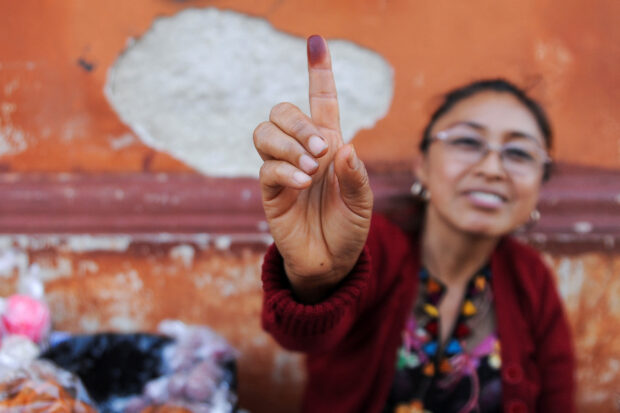
A woman shows her ink-stained finger during the first round of Guatemala’s presidential election in Guatemala City, Guatemala, June 25, 2023. REUTERS
GUATEMALA CITY — Polling stations closed on Sunday evening in Guatemala’s tight presidential election, which has been dominated by international concerns over corruption, the exclusion of a leading candidate and the cost of living.
The contest is expected to go to a run-off in August, with former first lady Sandra Torres tipped to win the first round though expected to fall short of the 50% plus one vote needed for an outright victory.
Torres is up against more than 20 other candidates, including Edmond Mulet, a career diplomat, and Zury Rios, daughter of the late dictator Efrain Rios Montt.
Entry to polling stations closed at 6:00 p.m. local time (0000 GMT). Preliminary results are expected from 9:30 p.m. local time on Sunday.
Young voters headed to the polls for the first time, including a 19-year-old student, Maximo Santacruz, who said he relied on social media to decide who to vote for.
“All the young people right now will have a role in politics in Guatemala in 20 years time… I got informed mainly via Tik Tok,” he said.
Julio Valenzuela, a 40-year-old audio producer, said he hopes the new leader can build a brighter future and stick to their campaign promises.
“What we Guatemalans hope is that everything they have promised is fulfilled… We want them (politicians) to deliver and not only with the urban area but also in the interior,” he said as he cast his vote.
The race to succeed conservative President Alejandro Giammattei, who is limited by law to one term, has been overshadowed by a court ruling to block four candidates from the ballot including early front-runner, businessman Carlos Pineda.
The United States and the European Union criticized the exclusion of Pineda, who called the decision “electoral fraud.”
“We do not see a process that is governed by international standards, but rather one where arbitrary criteria are used,” said Carolina Jimenez, president of think tank Washington Office on Latin America (WOLA). “That is tremendously serious.”
Meanwhile, unrest in the town of San Jose del Golfo, near the capital, meant elections there were postponed till August, Supreme Electoral Tribunal official Irma Palencia said at a press conference.
Stakes in the election are high, given deteriorating standards of transparency and human rights in recent years, as well as ongoing poverty, corruption and violence.
“I have always voted for Sandra Torres because she helped my (community) a lot (as first lady). She gave money, food and a lot of help to poor people,” said Maria Consuelo Ruano, 72, a housewife.
“I would also feel happy if Mulet goes to the second round,” she added. “(He) looks like he’s an honest man, different from Giammattei.”
Political analysts however predict a fragmented Congress will limit any of the candidates from enabling real change.
Polls currently forecast that Torres, the ex-wife of late president Alvaro Colom – who governed from 2008 to 2012 – will likely lose a head-to-head runoff given her lack of popularity in the capital Guatemala City, home to a high percentage of the electorate.
This is the 67-year-old politician’s third run for president. She finished second in the previous two races.
Around 9.3 million eligible voters are choosing a new Congress, hundreds of mayors and 20 members of the Central American Parliament, in addition to electing the president and vice president.
RELATED STORIES